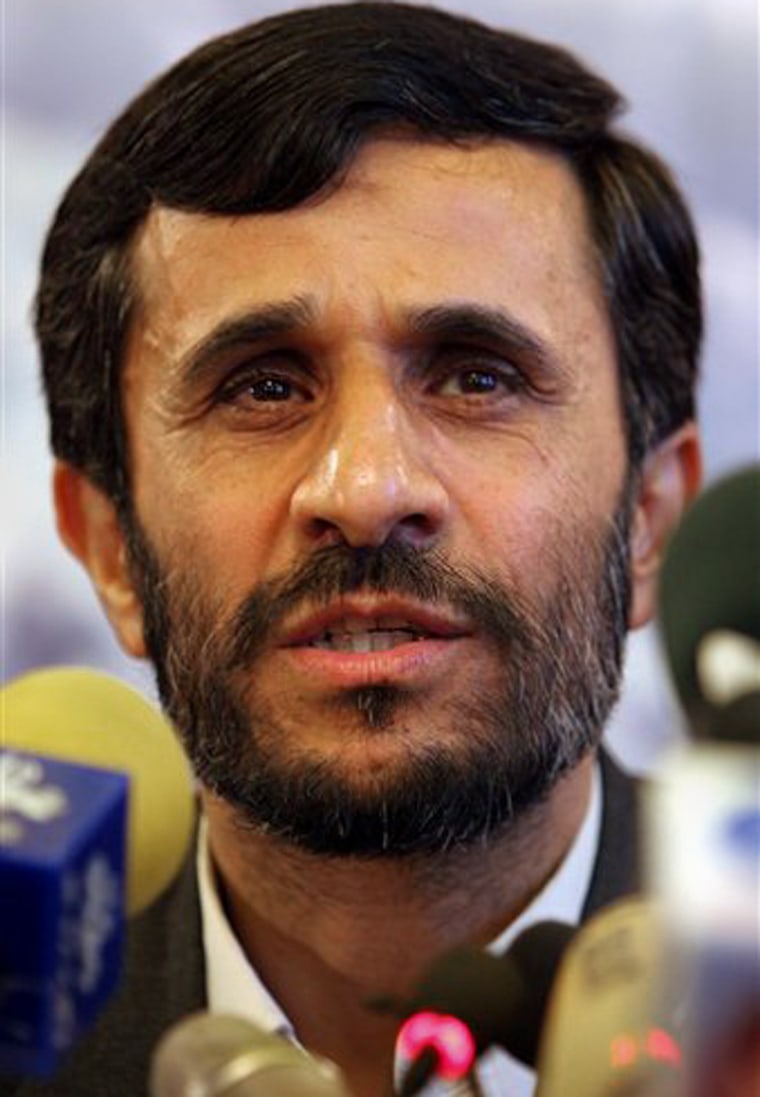European negotiators urged Iran's president-elect Monday to maintain a suspension of uranium enrichment activities, a day after he vowed to restart the nation's controversial nuclear program.
Two inspectors from the International Atomic Energy Agency, meanwhile, arrived in Iran for talks that were expected to include reports that Iran worked secretly with plutonium, a possible component of nuclear bombs.
Hard-liner Mahmoud Ahmadinejad, elected by a landslide Friday, said the 20-year-old nuclear program was needed for peaceful purposes. The United States believes Tehran is seeking to develop atomic bombs.
"We need the peaceful nuclear technology for energy, medical and agricultural purposes and our scientific progress. We will continue this," Ahmadinejad said Sunday at a news conference.
Iran suspended all uranium enrichment-related activities in November to avoid possible sanctions from the U.N. Security Council, but it said all along the suspension was temporary.
Financial benefits to halting uranium enrichment
France, Britain and Germany, which are negotiating on behalf of the European Union, have offered economic incentives in hopes of persuading Iran to permanently halt enrichment. Uranium enriched to low levels has energy uses, while highly enriched uranium can be used in bombs.
In Washington, President Bush said the West should send Iran "a focused, concerted, unified message that says the development of a nuclear weapon is unacceptable and a process which would enable Iran to development a nuclear weapon is unacceptable."
He spoke after a meeting with visiting German Chancellor Gerhard Schroeder, who said he agreed with Bush.
"We are going to continue being tough and firm on that," Schroeder said.
Ahmadinejad said Sunday that Iran's decision would not change, but he did not say when the resumption would begin.
"This is the final path we have taken," he said.
Concerning Iran's negotiations with the European nations, Ahmadinejad said he was waiting for specific offers to break the stalemate.
"We will continue talks with Europeans while preserving our national interests and insistence on the right of the Iranian nation to use nuclear energy," he said.
France, Britain and Germany said Monday they strongly hoped the Islamic state would maintain the suspension of enrichment activities and continue negotiations.
"We look to the Iranian government under its new president-elect to honor these commitments," Britain's Foreign Secretary Jack Straw said in London.
French Foreign Minister Philippe Douste-Blazy said he hoped the calendar of negotiations would not change.
The November agreement says "it is absolutely necessary, in EU-Iran relations, that we can continue this diplomatic activity concerning the suspension of the nuclear program," he said while visiting Poland. "This is clearly important and we hope it will be possible."
Asked about relations with the United States, Ahmadinejad said Sunday that Iran "is taking the path of progress based on self-reliance. It doesn't need the United States significantly on this path."
Rumsfeld: Iran president is ‘no friend of democracy’
In a sign of tensions likely ahead, Defense Secretary Donald Rumsfeld said Ahmadinejad is "no friend of democracy" and he dismissed the vote as a "mock election."
Ahmadinejad said his government's foreign policy would focus on "peace, moderation and coexistence."
He promised to shun extremism and cobble together a moderate regime.
Yet critics say his election only consolidated the hard-liners' hold on power, and no reform-minded people remain in the government.
"He is a person who is very much supportive of the current ayatollahs, who are telling the people of that country how to live their lives, and my guess is over time the young people and women will find him as well as his masters unacceptable," Rumsfeld said on "Fox News Sunday."
Election concerns linger
On Monday, EU foreign policy chief Javier Solana said he saw no reason to change policy on Iran after Ahmadinejad's election. Solana and other EU officials also demanded Iran address claims of voter irregularities in the presidential vote.
"I have some doubts about ... the manner in which the election has taken place," Solana said.
Kazem Jalali, a spokesman for Iran's Parliamentary National Security and Foreign Policy Committee, told the EU to mind its own business.
"It's none of their business. The Iranian authorities investigate all complaints based on our law," Jalali told The Associated Press. "There is no need for any warning by the European Union or any other foreign entities."
During their visit, the two representatives of the U.N. nuclear watchdog agency will see some nuclear facilities, aides to Vice President Gholamreza Aghazadeh told the AP.
The officials said the talks with Iranian nuclear officials also would include the dispute caused by a recent IAEA report claiming Iran had acknowledged working with small amounts of plutonium longer than it originally disclosed.
Iran criticized the report, accusing agency officials of playing up information Tehran itself had provided.
